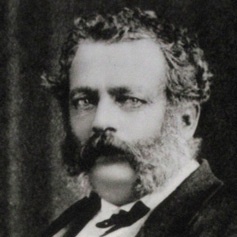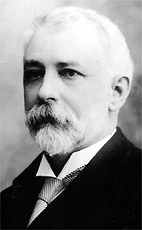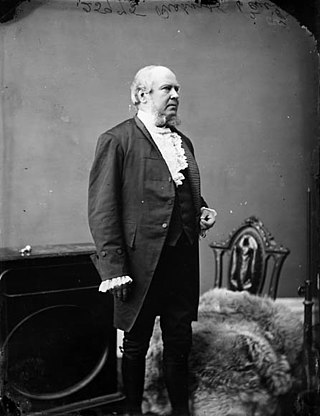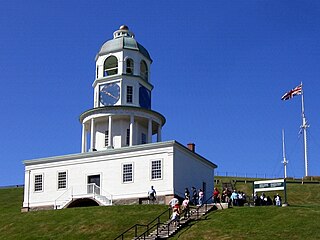
Sir Charles Tupper,1st Baronet was a Canadian Father of Confederation who served as the sixth prime minister of Canada from May 1 to July 8,1896. As the premier of Nova Scotia from 1864 to 1867,he led Nova Scotia into Confederation. He briefly served as the Canadian prime minister,from seven days after parliament had been dissolved,until he resigned on July 8,1896,following his party's loss in the 1896 Canadian federal election. He is the only medical doctor to have ever held the office of prime minister of Canada and his 68-day tenure as prime minister is the shortest in Canadian history.

Sir John Sparrow David Thompson was a Canadian lawyer,judge and politician who served as the fourth prime minister of Canada from 1892 until his death. He had previously been fifth premier of Nova Scotia for a brief period in 1882,and as of 2024,is the only prime minister who was previously a provincial premier.

Sir Hugh Hoyles was a politician and lawyer who served as the third premier of the colony of Newfoundland. Hoyles was the first premier of Newfoundland to have been born in the colony,and served from 1861 to 1865. Born in St. John's,he was the son of Newman Hoyles,the first leader of the Tory Party.

Joseph Howe was a Nova Scotian journalist,politician,public servant,and poet. Howe is often ranked as one of Nova Scotia's most admired politicians and his considerable skills as a journalist and writer have made him a provincial legend.

Hiram Blanchard was a Nova Scotia lawyer,politician,and the first premier of Nova Scotia. Blanchard won election to the Nova Scotia legislative assembly in Inverness in 1859 as a Liberal.

The Nova Scotia Liberal Party is a centrist provincial political party in Nova Scotia,Canada and the provincial section of the Liberal Party of Canada. The party currently forms the Official Opposition in Nova Scotia,under the leadership of Zach Churchill. The party was in power most recently from the 2013 election until the 2021 election.

William Stevens Fielding,was a Canadian Liberal politician,the seventh premier of Nova Scotia (1884–96),and the federal Minister of Finance from 1896 to 1911 and again from 1921 to 1925.
Charles Hazlitt Cahan was a Canadian lawyer,newspaper editor,businessman,and provincial and federal politician.

Sir Charles Hibbert Tupper was a Canadian lawyer and politician.

Sir Joseph Andrew Chisholm was Mayor of Halifax and Chief Justice of the Supreme Court of Nova Scotia.

Province House in Halifax is where the Nova Scotia legislative assembly,known officially as the Nova Scotia House of Assembly,has met every year since 1819,making it the longest serving legislative building in Canada. The building is Canada's oldest house of government. Standing three storeys tall,the structure is considered one of the finest examples of Palladian architecture in North America.

Sir William Johnstone Ritchie was one of the first judges appointed to the Supreme Court of Canada. He became the second chief justice of the court,and the second-longest serving Chief Justice to date.

The Halifax Public Gardens are Victorian-era public gardens formally established in 1867,the year of Canadian Confederation. The gardens are located in the Halifax,Nova Scotia on the Halifax Peninsula near the popular shopping district of Spring Garden Road and opposite Victoria Park. The gardens were designated a National Historic Site of Canada in 1984.

St. Paul's Church is a historically evangelical Anglican church in downtown Halifax,Nova Scotia,within the Diocese of Nova Scotia and Prince Edward Island of the Anglican Church of Canada. It is located at the south end of the Grand Parade,an open square in downtown Halifax with Halifax City Hall at the northern end.

Richard John Uniacke was an abolitionist,lawyer,politician,member of the Nova Scotia House of Assembly and Attorney General of Nova Scotia. According to historian Brian Cutherburton,Uniacke was "the most influential Nova Scotian of his day.... His faith in Nova Scotia's destiny as a partner in a great empire was only to be equalled by Joseph Howe." He devoted 49 years to public service in Nova Scotia. He fought in the American Revolution and later sought to emancipate Catholics and Black Nova Scotians who were slaves in Nova Scotia. He is buried in the crypt of St. Paul's Church. His substantial estate is preserved as the Uniacke Estate Museum Park at Mount Uniacke.

Richard John Uniacke was a lawyer,judge and political figure in Nova Scotia. He represented Cape Breton County in the Nova Scotia House of Assembly from 1820 to 1830.
Jonathan Sterns was a Loyalist from Boston,Solicitor General for Nova Scotia and political figure in Nova Scotia. He represented Halifax County in the Nova Scotia House of Assembly from 1793 to 1798.
Thomas Nickleson Jeffery was a colonial official and politician in Nova Scotia.

The North British Society was founded in Halifax,Nova Scotia in 1768,the oldest Scottish heritage society outside Great Britain. North British is an adjective used as an alternative to "Scottish".

The Royal Acadian School was a school developed for marginalized people in Halifax,Nova Scotia. The school was established by British officer and reformer Walter Bromley on 13 January 1814. He promoted the objectives of the British and Foreign School Society in Nova Scotia,under the sponsorship of Prince Edward. The first patron was Sir John Coape Sherbrooke.

















